Fermilab and the LHC
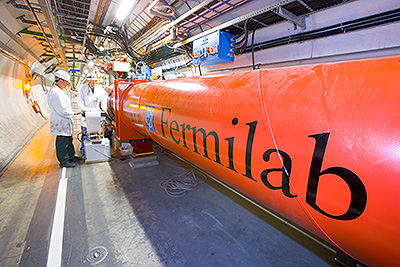
For more than two decades, Fermilab and its scientists have played a significant role in the Large Hadron Collider, particularly in the CMS experiment. Fermilab provides scientific, technical and organizational support for the hundreds of scientists and graduate students from 51 U.S. universities and laboratories that participate in the 2,900-member international CMS collaboration.
The LHC is the largest and the highest-energy particle accelerator in the world. It steers beams of particles on a collision course around a 17-mile ring located 300 feet underground and straddling the border of Switzerland and France. The beams collide at four designated collision points where experiments with multipurpose particle detectors register the collision products. Experiments at the LHC seek a greater understanding of nature by searching for new phenomena and particles and by investigating the properties of the particles and forces we know
Scientists working on the CMS experiment, together with scientists from the ATLAS experiment, announced the discovery of the Higgs boson in 2012. This discovery led to the 2013 Nobel Prize for physics being awarded to two theorists who had predicted the existence of the Higgs boson. Future discoveries might revolutionize our understanding of the universe.
When accelerated particles collide in the LHC, their kinetic energy can be converted into mass, meaning heavy particles that did not exist before the collisions can be created. Scientists can study these particles through their subsequent decays into lighter particles, which may decay into even lighter particles. All of this takes place in a split second, but CMS records data that allow scientists to piece together what happened. The LHC collides hundreds of millions of particles per second. Researchers create software that selects only the most interesting collisions, and they use those collisions to pick out difficult-to-uncover particles and phenomena. Scientists expect that some of these collisions may produce particles of dark matter or those predicted by theories beyond the Standard Model such as supersymmetry and extra dimensions.
Fermilab participated in the construction of the LHC accelerator and the CMS detector, contributing critical components such as the powerful magnets that focus beams into collision and many segments of the complex, 13,000-ton CMS detector. Fermilab scientists and engineers, in close collaboration with other U.S. research groups, are also actively building components for and conducting R&D towards future LHC accelerator and detector upgrades.
Fermilab hosts one of 11 Tier-1 computing centers that process data for the CMS experiment and support the research activities of scientists across the country and around the world. It also hosts a Remote Operations Center, where more than 100 scientists conduct thousands of hours of remote shifts for the CMS experiment each year, and the LHC Physics Center, a hub for CMS physics in the United States.
CMS
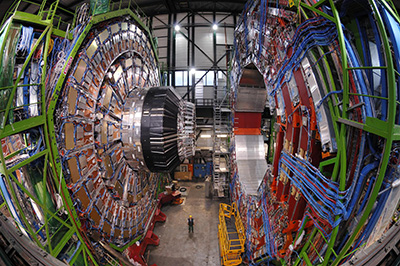
CMS is one of the two general-purpose experiments at the Large Hadron Collider at the European physics laboratory CERN. Its name stands for "Compact Muon Solenoid." The CMS detector investigates the results of particle collisions in search of new insights into the building blocks of the universe.
LHC Physics Center
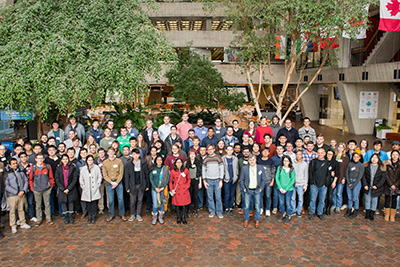
The LHC Physics Center is a central location for physicists to participate in LHC research in the United States. It serves as a resource and analysis hub for the nearly 900 physicists and graduate students from 51 U.S. universities and laboratories that participate in the CMS experimental collaboration.
LHC Remote Operations Center
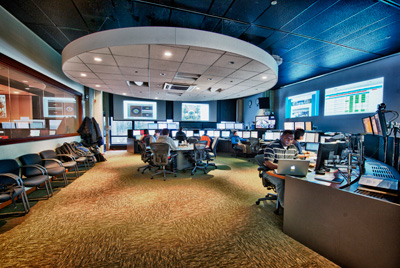
The LHC Remote Operations Center supports the operations of the CMS detector located 4,000 miles away in Cessy, France. The ROC allows US physicists and students to take detector monitoring shifts during US daytime hours, lessening the burden on CERN-based scientists to serve night shifts and helping US personnel fulfill their operational responsibilities in the CMS collaboration from an on-shore location.
Computing for colliders
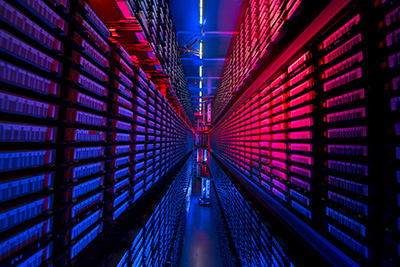
Fermilab provides state of the art computing, networking, and storage solutions to support the incredible data transfer, processing, and archiving required by CMS. Fermilab Computing has built and operates the largest CMS Tier-1 computing center in the world. It is essential to the CMS experiment and provides analysis capabilities to the LHC Physics Center at Fermilab and U.S. universities involved in the experiment.
- Last modified
- 03/12/2019
- email Fermilab

